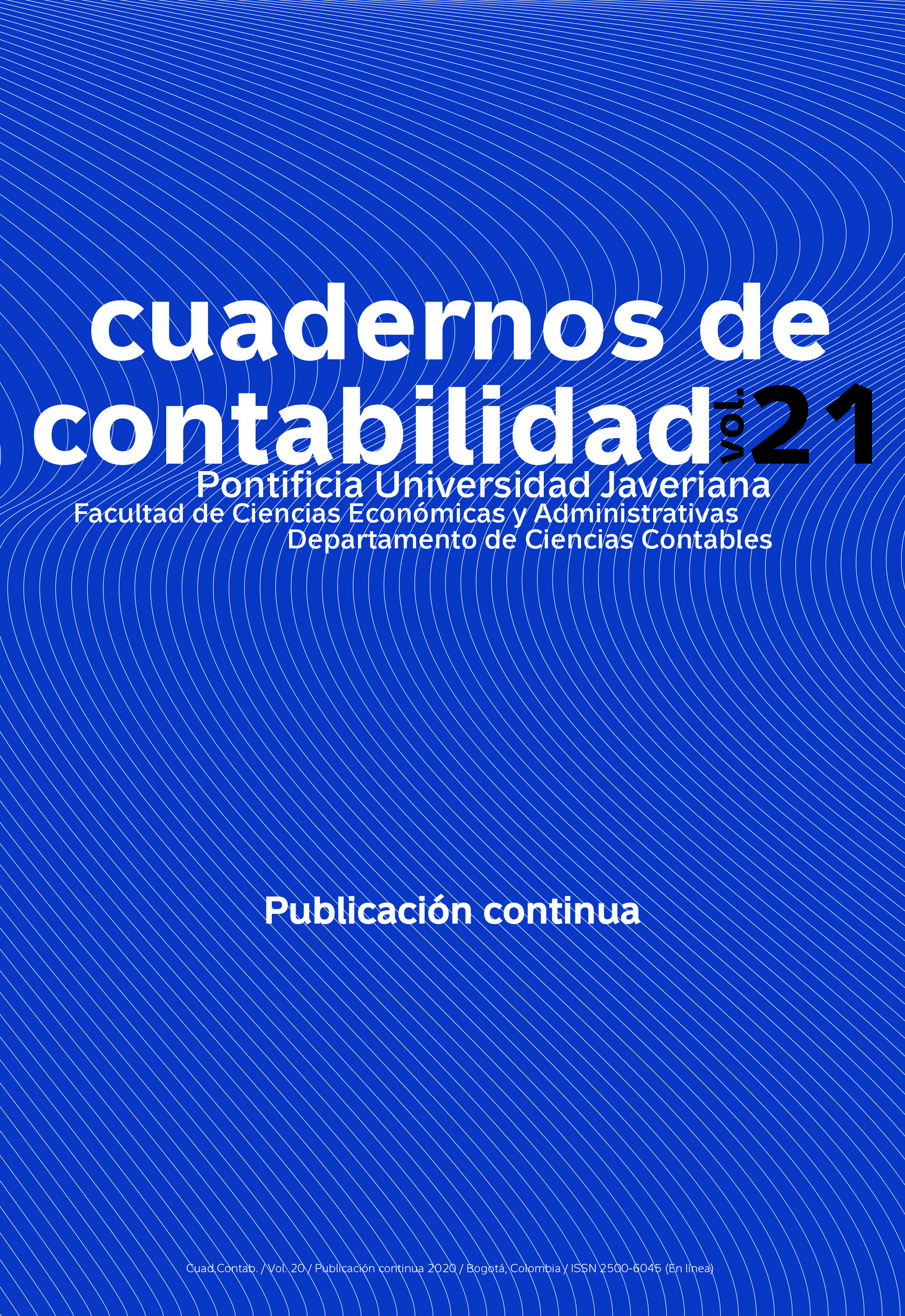Resumen
Este estudio analiza la importancia que los profesionales del área contable y financiera atribuyen a las habilidades en el uso de hojas de cálculo. Se trata de un levantamiento efectuado a partir de una muestra de 237 profesionales (auditores, contadores, controllers y analistas financieros) de Hispanoamérica, captados por LinkedIn. Se observa que las hojas de cálculo están entre las habilidades más necesarias para estos profesionales y su nivel de conocimiento es, en promedio, elevado, principalmente entre los controllers. Por otro lado, herramientas más avanzadas como Macros y Visual Basic for Application –VBA– presentan un nivel de conocimiento inferior. El conocimiento es adquirido principalmente en el trabajo y por autoaprendizaje, más que en las universidades. Los resultados revelan que los nuevos trabajadores tienen un nivel de conocimiento inferior a sus pares. Igualmente, para la mayoría de los profesionales las instituciones de educación superior deberían capacitar mejor a los alumnos en el uso de estas herramientas.
Bahador, K., Haider, A., & Saat, R. (2018). The enhancement of spreadsheet skills among practitioners within small medium accounting firms. International Journal of Engineering & Technology, 7(4.19), 212-216. Retrieved from https://www.sciencepubco.com/index.php/ijet/article/view/22050
Beuren, I. M. (2006). Como elaborar trabalhos monográficos em contabilidade. São Paulo: Editorial Atlas.
Bradbard, D., Alvis, C., & Morris, R. (2014). Spreadsheet usage by management accountants: An exploratory study. Journal of Accounting Education, 32(4), 24-30. https://doi.org/10.1016/j.jaccedu.2014.09.001
Burnett, S. (2003). The future of accounting education: A regional perspective. Journal of Education for Business, 78(3), 129-134. https://doi.org/10.1080/08832320309599709
Callegaro, M., Manfreda, K., & Vehovar, V. (2015). Websurvey Methodology. California: SAGE Publications.
Cardoso, R., Riccio, E., & Albuquerque, L. (2009). Competências do contador: um estudo sobre a existência de uma estrutura de interdependência. Revista de Administração da USP, 44(4), 365-379. http://rausp.usp.br/wp-content/uploads/files/v4404365.pdf
Chen, J., Damamtew, D., Banatte, J., & Mapp, J. (2009). Information technology competencies expected in undergraduate accounting graduates. Research in Higher Education Journal, 3, 1-7. https://www.aabri.com/manuscripts/09146.pdf
Cory, S., & Pruske, K. (2012). Necessary skills for accounting graduates: An exploratory study to determine what the profession wants. ASBBS Proceedings, 19(1), 208-218. http://asbbs.org/files/ASBBS2012V1/PDF/C/CoryS.pdf
Costa, R. M. (2012). Os programas de treinamento, desenvolvimento e educação corporativa e o nível de maturidade em gestão de pessoas: Um estudo baseado no People Capability Maturity Model. Dissertação de Mestrado. Pontifícia Universidade Católica do Rio de Janeiro, Rio de Janeiro, RJ, Brasil.
De Luiz, N. (2001). Qualificação, competências e certificação: visão do mundo do trabalho. Formação, Brasília, 1(2), 5-15. https://www.paho.org/bra/index.php?option=com_docman&view=download&alias=585-qualificacao-competencias-e-certificacao-visao-do-mundo-do-trabalho-5&category_slug=formacao-e-capacitacao-rh-165&Itemid=965
Depresbiteris, L. (1989). O Desafio da avaliação da aprendizagem: dos fundamentos a uma proposta inovadora. São Paulo, E.P.U.
Dillman, D. (2000). Mail and Internet surveys. New York: John Wiley & Sons.
Elsaadani, M. (2015). Information and communication technology skills’ sufficiency of Egyptian accounting graduates. International Journal of Advanced Information Technology, 5(1/2), 1-11. https://doi.org/10.5121/ijait.2015.5201
Fleury, M., & Fleury, A. (2001). Construindo o conceito de competência. Revista de Administração Contemporânea, 5(Edição Especial), 183-196. https://doi.org/10.1590/S1415-65552001000500010
Grimm, S., & Blazovich, J. (2016). Developing student competencies: An integrated approach to a financial statement analysis project. Journal of Accounting Education, 35, 69-101. https://doi.org/10.1016/j.jaccedu.2016.01.001
Kearns, G. (2014). The importance of Accounting Information System in the Accounting Curricula: A CPA Perspective. AIS Educator Journal, 9(1), 24-40. https://doi.org/10.3194/1935-8156-9.1.24
Lee, C., Tang, H., Sam, K., & Xiong, G. (2018). Spreadsheet proficiency: Which spreadsheet skills are important? Journal of Information Technology Management, 29(3), 35. http://jitm.ubalt.edu/XXIX-3/article4.pdf
Malik, S. (2005). Enterprise Dashboards: design and best practices. New Jersey: John Wiley & Sons.
Marin, T., Lima, S., & Casa Nova, S. (2014). Formação do contador – o que o mercado quer, é o que ele tem? Um estudo sobre o perfil profissional dos alunos de ciências contábeis da FEA-USP. Revista Contabilidade Vista & Revista, 25(2), 59-83. https://revistas.face.ufmg.br/index.php/contabilidadevistaerevista/article/view/1532
Martins, G., & Theóphilo, C. (2009). Metodologia da investigação científica para ciências sociais aplicadas. São Paulo: Atlas.
Miranda, C. (2011). Ensino em contabilidade gerencial: uma análise comparativa de percepções de importância entre docentes e profissionais, utilizando as dimensões de atividades, artefatos e competências. Tese de Doutorado, Universidade de São Paulo, São Paulo, SP, Brasil.
Osmani, M., Hindi, N., & Al-Esmail, R. (2017). Examining graduate skills in accounting and finance: The perception of Middle Eastern students. Industry and Higher Education, 31(5), 318-327. https://doi.org/10.1177/0950422217721759
Pan, P., & Perera, H. (2012). Market relevance of university accounting programs: Evidence from Australia. Accounting Forum, 36(2), 91-108. https://doi.org/10.1016/j.accfor.2011.11.001
Pathways Commission. (2015). In Pursuit of Accounting’s Curricula of the Future. Recuperado de: <http://commons.aaahq.org/groups/2d690969a3/summary>.
Ragland, L., & Ramachandran, U. (2014). Towards an understanding of excel functional skills needed for a career in public accounting: Perceptions from public accountants and accounting students. Journal of Accounting Education. 32(4), 113-129. https://doi.org/10.1016/j.jaccedu.2014.03.002
Siegel, G., & Kulesza, C. (1996). The practice analysis of management accounting. Management Accounting, 70(10), 20-28. https://doi.org/10.12691/jbms-4-1-3
Sithole, S. T. (2015). Quality in accounting graduates: Employer expectations of the graduate skills in the bachelor of accounting degree. European Scientific Journal, 11(22), 165-180. https://ssrn.com/abstract=3073025
Umbach, P. D. (2004). Web surveys: Best practices. New directions for institutional research, 121, 23-38. https://doi.org/10.1002/ir.98
Waaijer, C., Belder, B., Van, B., Sonneveld, H., & Van, D. (2015). Survey on the Labour Market Position of PhD graduates. Working in Paper of Centre for Science and Technology Studies. Universidad de Leiden. Leiden: Holanda.
Willis, V. F. (2016). A model for teaching technology: Using Excel in an accounting information systems course. Journal of Accounting Education, 36, 87-99. https://doi.org/10.1016/j.jaccedu.2016.05.002
El aval sobre la intervención de la obra (revisión, corrección de estilo, traducción, diagramación) y su posterior divulgación se otorga mediante una licencia de uso y no a través de una cesión de derechos, lo que representa que la revista y la Pontificia Universidad Javeriana se eximen de cualquier responsabilidad que se pueda derivar de una mala práctica ética por parte de los autores. En consecuencia de la protección brindada por la licencia de uso, la revista no se encuentra en la obligación de publicar retractaciones o modificar la información ya publicada, a no ser que la errata surja del proceso de gestión editorial. La publicación de contenidos en esta revista no representa regalías para los contribuyentes.



